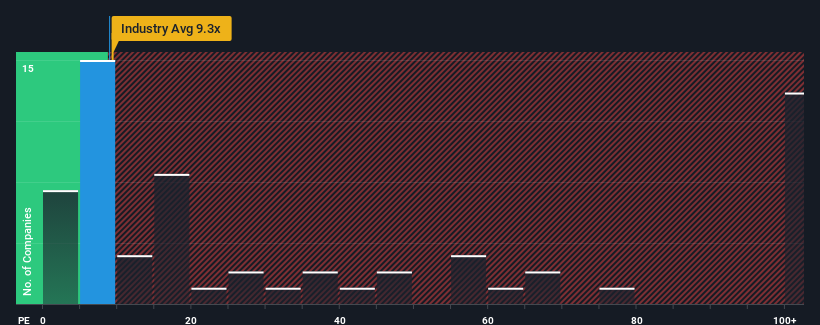- South Korea
- /
- Capital Markets
- /
- KOSE:A039490
Take Care Before Diving Into The Deep End On Kiwoom Securities Co., Ltd. (KRX:039490)
Kiwoom Securities Co., Ltd.'s (KRX:039490) price-to-earnings (or "P/E") ratio of 8.9x might make it look like a buy right now compared to the market in Korea, where around half of the companies have P/E ratios above 12x and even P/E's above 24x are quite common. However, the P/E might be low for a reason and it requires further investigation to determine if it's justified.
While the market has experienced earnings growth lately, Kiwoom Securities' earnings have gone into reverse gear, which is not great. It seems that many are expecting the dour earnings performance to persist, which has repressed the P/E. If this is the case, then existing shareholders will probably struggle to get excited about the future direction of the share price.
View our latest analysis for Kiwoom Securities

Does Growth Match The Low P/E?
Kiwoom Securities' P/E ratio would be typical for a company that's only expected to deliver limited growth, and importantly, perform worse than the market.
If we review the last year of earnings, dishearteningly the company's profits fell to the tune of 49%. The last three years don't look nice either as the company has shrunk EPS by 61% in aggregate. So unfortunately, we have to acknowledge that the company has not done a great job of growing earnings over that time.
Shifting to the future, estimates from the twelve analysts covering the company suggest earnings should grow by 137% over the next year. Meanwhile, the rest of the market is forecast to only expand by 33%, which is noticeably less attractive.
With this information, we find it odd that Kiwoom Securities is trading at a P/E lower than the market. Apparently some shareholders are doubtful of the forecasts and have been accepting significantly lower selling prices.
The Key Takeaway
Generally, our preference is to limit the use of the price-to-earnings ratio to establishing what the market thinks about the overall health of a company.
We've established that Kiwoom Securities currently trades on a much lower than expected P/E since its forecast growth is higher than the wider market. When we see a strong earnings outlook with faster-than-market growth, we assume potential risks are what might be placing significant pressure on the P/E ratio. At least price risks look to be very low, but investors seem to think future earnings could see a lot of volatility.
You need to take note of risks, for example - Kiwoom Securities has 3 warning signs (and 1 which is concerning) we think you should know about.
If these risks are making you reconsider your opinion on Kiwoom Securities, explore our interactive list of high quality stocks to get an idea of what else is out there.
Valuation is complex, but we're here to simplify it.
Discover if Kiwoom Securities might be undervalued or overvalued with our detailed analysis, featuring fair value estimates, potential risks, dividends, insider trades, and its financial condition.
Access Free AnalysisHave feedback on this article? Concerned about the content? Get in touch with us directly. Alternatively, email editorial-team (at) simplywallst.com.
This article by Simply Wall St is general in nature. We provide commentary based on historical data and analyst forecasts only using an unbiased methodology and our articles are not intended to be financial advice. It does not constitute a recommendation to buy or sell any stock, and does not take account of your objectives, or your financial situation. We aim to bring you long-term focused analysis driven by fundamental data. Note that our analysis may not factor in the latest price-sensitive company announcements or qualitative material. Simply Wall St has no position in any stocks mentioned.
About KOSE:A039490
Kiwoom Securities
Provides online brokerage services in South Korea and internationally.
Good value with acceptable track record.
Market Insights
Community Narratives




